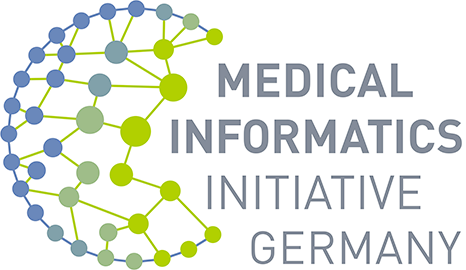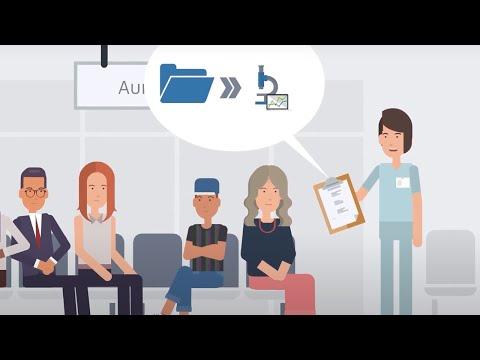Table of Contents:
- Consent documents coordinated with data protection authorities and ethics committees
- Updated handout and further application recommendations
- Additional documents (simple language, minors, use in studies, additional modules, revocations)
- More information
The challenge:
Detailed consent provided by a patient or clinical study participant plays a decisive role in determining how personal health data can be used for future research. For the consistent use of data for medical research across Germany, it is critical to ensure essential elements of patient information and consent forms are standardised. Not all future research goals are known at the time the data are captured. It is therefore necessary to describe potential future use of data for research and healthcare in very general terms when a patient/participant declares consent (broad consent). German legislation governing data protection and hospital activities varies from state to state in terms of what research can be conducted using patient-care data without explicit consent. Similarly, there is no consensus among state oversight agencies with regard to how broad consent should be worded.
Achievements to date:
All participating university hospitals have agreed on a strictly consent-based approach: while in hospital, the patient is asked to consent to future use of clinical data on the basis of clearly expressed information. They have agreed on a standardised template text for both patient information and consent. This includes identical consent options for patients, enabling data to be used consistently across sites and consortia at a later date. The expertise of recognized actors and organizations throughout Germany, such as the Biobanks Working Group of the Medical Ethics Committee and the Data Protection Working Group of the TMF, has been incorporated into the development and coordination of the template text. The Conference of Independent Data Protection Commissioners of the Federal Government and the German federal states gave their approval to the template text on 15 April 2020. Established dialogue procedures between the relevant working groups and the TMF - Technology and Methods Platform for Networked Medical Research e.V. as an association of scientific experts were used for coordination with the data protection authorities of the federal states.
Explanatory film for patients:
Approved documents:
Download: Template text (English)
version 1.6d (10/11/2020) [PDF | 445 kb]
Download: Guide to the Use of Nationally Harmonised Patient Information and Consent Documents for the Secondary Use of Patient Data (English)
version 0.9d (10/11/2020) [PDF | 354 kb]
Further language versions:
- German:
Download: Template text (German)
version 1.6d (16/04/2020) [PDF | 445 kb]
- Turkish:
Download: Template text (Turkish)
version 1.6d (21/01/2021) [PDF | 445 kb]
- Arabic:
Download: Template text (Arabic)
version 1.6d (14/11/2022) [PDF | 408 kb]
Updated handout and further application recommendations:
Download: Handreichung zur Version 1.7.2 und Varianten für Kinder, Jugendliche und Sorgeberechtigte (German)
version 1.5 (21/03/2025) [PDF]
Weitere Sprachversionen:
- Russian:
Download: Russian version of the sample text Patient consent
Version 1.7.2 (11.08.2025) [PDF | 386 kb]
Download: Russian version of the sample text Patient consent with German comments
Version 1.7.2 (11.08.2025) [PDF | 429 kb]
New variants of the consent documents and supplementary offerings:
Simple language:
Download: Template text for the explanation in simple language for patient information - variant without biomaterial module (German)
version 6 based on the original text of the patient information in version 1.6d (27/09/2022) [PDF]
Download: Template text for the explanation in simple language for patient information - variant with biomaterial module (German)
version 6 based on the original text of the patient information in version 1.6d (27/09/2022) [PDF]
Minors:
Download: Template text for the information and consent of parents/guardians of minors (German)
version 1.1 (23/11/2022) [PDF]
Download: Template text for the information and consent of minors (12-17 years) (German)
version 1.1 (24/11/2022) [PDF]
Download: Template text for the information and consent of minors (7-11 years) (German)
version 1.1 (24/11/2022) [PDF]
Module for the broad reuse of study data and biosamples:
Download: Sample text for information and clarification on the broad re-use of study data and biosamples to be included as a supplement in study consents (German)
version 1.0 (21/03/2025) [PDF]
Optional withdrawal forms:
Download: MII sample text withdrawal form ‘Complete withdrawal’ (compatible with MII BC 1.7.2)
Download: MII sample text withdrawal form ‘Partial withdrawal’ (compatible with MII BC 1.7.2)
Modules for minor project-related additions to the Broad Consent:
More information:
Zu den Informationen zum Umgang mit genetischen Daten im Rahmen der Medizininformatik-Initiative (German)
(08/12/2020)
Download: Pressemitteilung - Medizininformatik-Initiative erhält grünes Licht für bundesweite Patienteneinwilligung (German)
(27/04/2020) [PDF | 184 kb]
Download: Begründung für eine krankheitsübergreifende Zweckbestimmung in den Einwilligungserklärungen der Medizininformatik-Initiative" (German)
(21/09/2018) [PDF | 324 kb]
Statements of the consent working group of the Medical Informatics Initiative:
Download: Stellungnahme zur Eigentumsübertragung bei Biomaterial und Drittlandsübermittlungen (German)
(26/08/2019) [PDF | 378 kb]
Download: Stellungnahme zu patientenindividueller Datennutzungstransparenz und Dynamic Consent (German)
(28/03/2019) [PDF | 345 kb]




